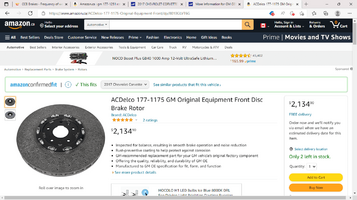Hi all,
For those with CCBs on your Grand Sport or Z06, how often (kms/time) are you pulling off your CCB rotors to weigh them to make sure they are above the min weights?
I have 14k kms on mine, including a bunch of track time at Calabogie and will be pulling mine off in a couple days when I change the pads (for the second time...).
Are there any other symptoms of the rotors starting to wear to their minimum weight/thickness other than measuring?
Thanks!
Adam
For those with CCBs on your Grand Sport or Z06, how often (kms/time) are you pulling off your CCB rotors to weigh them to make sure they are above the min weights?
I have 14k kms on mine, including a bunch of track time at Calabogie and will be pulling mine off in a couple days when I change the pads (for the second time...).
Are there any other symptoms of the rotors starting to wear to their minimum weight/thickness other than measuring?
Thanks!
Adam
